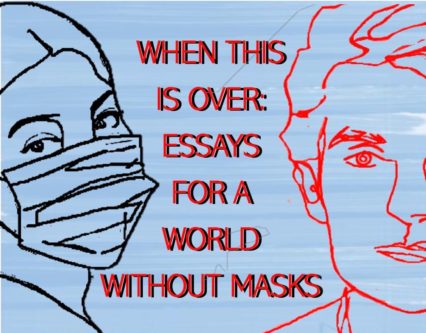Wales Arts Review asked some of Wales’s top writers to pen some thoughts on the future. This new series brings together a wide variety of perspectives and ideas in a vibrant array of styles and forms, expressing hopes for a new way of doing things when the Covid-19 coronavirus is finally overcome. Political, personal, sociological, ecological, cultural – this is an evolving tableau of ideas. Here Carys Davies sees hope for the future in literature.
 None of us knows yet what our damaged, economically poorer world is going to look like, but one of my biggest hopes right now is bound up with one of my biggest fears – that populist nationalism will not only continue to rise, but become more entrenched and widespread.
None of us knows yet what our damaged, economically poorer world is going to look like, but one of my biggest hopes right now is bound up with one of my biggest fears – that populist nationalism will not only continue to rise, but become more entrenched and widespread.
At the moment the signs are that by the time this pandemic is behind us, individual countries will have turned inwards. They’ll have reduced their reliance on foreign imports and increased limits on immigration and tourism. A lot of people will still feel very afraid – afraid for their health, the safety of their families, and their financial security. Governments, meanwhile, will be busy constructing a narrative to defend the way they handled the crisis, and whenever they can, they’ll blame other countries for their failures. All of which is likely to inflame the same nationalist instincts which swept the world in the wake of the 2008 financial crash – from India to the United States, from Australia to Brazil, from Hungary to the UK, and across Europe.
It’s a grim prognosis, and I don’t pretend to know how to turn it around, but I do know that what’s pernicious about populist nationalism is that it relies on the telling and acceptance of a single narrative – one strident version of the past, present, and future. A narrative in which the past is always better, the problems of the present are the fault of other people, and the future (once we’ve fixed the problems caused by other people and returned to the past) will be great (again). A narrative which leads to violence, hate crimes, and anti-democratic laws.
What makes me hopeful is that literature, at its best, is the very opposite of that. The best literature helps us see that there is never one single, unchanging narrative. It is the portrayal and exploration of experiences which are various, new, strange, surprising, complicated, nuanced, many-sided, contested, logical, illogical, reliable, unreliable, funny, sad, frightening, uplifting, ordinary, sublime.
I’ve been amazed by the energy, commitment, and resourcefulness with which literature is being taught in these testing times of virtual education, and it only makes me more hopeful that, with the pandemic behind us, great fiction will help the young navigate their way through the slogans, rallies, tweets, press conferences, redacted documents, conspiracy theories, violence, and anti-democratic laws of the populist myth-makers.
Literature, after all, helps us see how stories are made: how they are constructed, and told, and to what purpose. It trains us to look between the lines, at what’s been put on the page and what’s been left out. It makes us more astute in evaluating different points of view, and to recognise when our deepest emotions are being played with. It allows us to view the world from a position of informed doubt, and to decide for ourselves if the stories we’re being told resemble recognisable truths.
Literature makes me less worried, too, about travelling less, because I know that with imagination, and empathy, and a desire to find things out, it’s still possible to inhabit other lives. I’ve packed so many bags over the years and journeyed to so many faraway places, only to shuttle between airports and hotels and come home a week later completely unaltered. And yet with the small pile of books that have kept me company in isolation these past few weeks, I’ve felt my outlook shift, over and over. I’ve read novels by Anuk Arudpragasam and Leo Tolstoy, by Rohinton Mistry and Thomas Mann and Marieke Lucas Rijneveld, short stories by Etgar Keret and Tim Winton, poetry by Sharon Olds and Ocean Vuong. In less than a month, I’ve been to Russia and Sri Lanka and India, to Germany and the Netherlands, to Israel, Australia and America. I’ve lived in three different centuries, and been engrossed in stories about politics and the human heart, war and commerce, religion and sexuality, race and family; stories about being very rich and very poor, very old and very young.
I don’t know what the future holds, but I do know that, challenging as our present moment is for publishers and booksellers and many writers, there will be new books. New novels and new short stories, new poems and new plays. We will write them and we will read them. The young will read them. And that makes me very optimistic, because however firmly our physical borders slam shut, and however mendacious and self-serving our national myths become, our imaginative borders will stay open. We will continue, through fiction, to cross frontiers and boundaries, and be continually forced into a reckoning with reality, and with ourselves as human beings.
Carys Davies is a Welsh short story writer and novelist and the winner of the 2015 Frank O’Connor Award. Her debut novel West was shortlisted for the Rathbones Folio Prize, Runner Up for the Society of Authors’ McKitterick Prize, and winner of the Wales Book of the Year for Fiction. Her second novel The Mission House will be out in August 2020.
_______________________________________________________________________
Recommended for you:
The Joy of Books with Carys Davies
Award-winning novelist and short story writer Carys Davies divulges her reading likes and dislikes in the latest of our Q&A series.
The Mission House | Novel by Carys Davies
Gareth Smith reviews award-winning writer Carys Davies’ latest novel, The Mission House, which follows a middle-aged ex-librarian Hilary.
_______________________________________________________________________











